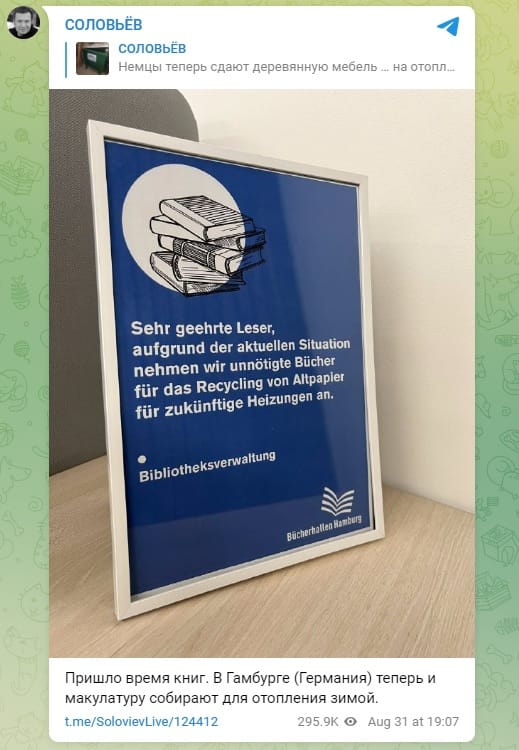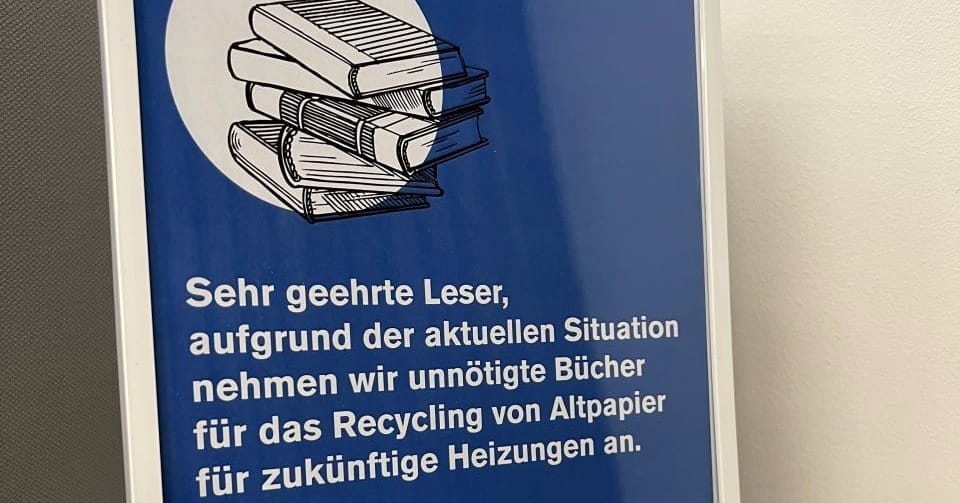A photo of a poster allegedly printed in Germany recently gained popularity on social networks. The inscription on it encourages people to donate books so that they can later be used for heating. We have verified the accuracy of such messages.
At the end of August and beginning of September 2022, social media users talked about an unusual initiative allegedly proposed by the Hamburg Library. It is alleged that the institution posted a poster stating that readers can bring unnecessary books - in the future they will be used for heating, since in conditions developing energy crisis Many Germans (and Europeans in general) are concerned about the sharply increased prices for gas and other fuels. Many authors of such publications saw in this initiative of the Hamburg Library parallels with the burning of books at the stake during the time of Hitler.
On the evening of August 31st photograph published TV presenter Vladimir Solovyov (1.1 million subscribers at the time of writing this analysis) in his Telegram channel. The channel “Live broadcast" (2.4 million subscribers) and "Voblya news"(1.1 million subscribers). At the same time, users shared the photo “VKontakte" And Twitter.

Publications about the very unusual initiative of the Hamburg Library also spread in the German-language Telegram segment - for example, on August 31 with a link to a “Live broadcast” about it told quite popular channel Neues aus Russland (“News from Russia”, 181,000 subscribers). This post interested our colleagues from the Correctiv project, who often check the accuracy of the publication of “News from Russia” and called channel “known for its pro-Russian disinformation.” They talked there, in particular, about allegedly carried out in Boston, gender reassignment surgeries for teenagers and, in all likelihood, groundlessly attributed Fidel Castro quote about the war between Russia and fascism, which will be called democracy.
Our German colleagues point out that there are inaccuracies and typos in the inscription on the poster. For example, the word “unnecessary” (unnötige) is misspelled with an extra letter t (unnötigte). The authors also use the phrase für zukünftige Heizungen, which literally translates as “for future heaters” - according to fact checkers from Correctiv, this phrase “does not make sense” from a linguistic point of view. The sentence also uses the construction für ... für, a peculiar similarity to the Russian clerical phrase “in order to ... in order,” which is usually avoided.
Note that the only element in the image that allows us to associate it with the Hamburg Library (Bücherhallen Hamburg) is its logo in the lower right corner. The short video, also published on Telegram channels, does not contain interior details, employees, identity elements or library cards that would suggest that the video was filmed in one of the more than three dozen reading rooms owned by this institution. The logo itself can be freely downloaded on the Internet.
Already on September 1, one of the Twitter users asked library representatives to comment on the viral photo. The institution's account responded by calling the photo a fake. When another user drew the library's attention to the existence of a four-second video showing the poster, he was told that this did not change the position already voiced, and was informed of plans to issue a detailed press release in the near future. His published the next day - the institution, in particular, announced that it was going to court due to the dissemination of false information and the illegal use of its logo. Library Statement confirmed in comments to AFP, Enno Isermann, spokesman for the department of culture and media in the Hamburg government.
According to TGStat, Russian publicist Armen Gasparyan was the first to talk about the poster in the Hamburg Library - a post on his Telegram channel appeared August 30. On the same day, as stated in the press release, concerned citizens began to ask the institution whether they really posted such a poster. We could not find earlier publications by other authors on Telegram and other social networks dedicated to the call to donate books for heating.
Gasparyan in his publication reports that the photo and short video were sent to him by a reader who regularly visits the institution. This model of information dissemination is quite popular:
- at the beginning of September, the channel “Ponomar” (and behind it, in particular, Vladimir Solovyov) with a link to a subscriber reported about a questionnaire with questions about the “special operation in Ukraine”, which supposedly needs to be filled out when leaving Estonia;
- same channel earlier wrote about the tweet of the former Japanese defense minister calling on the Ukrainian army not to bomb the Zaporozhye nuclear power plant. The source was allegedly a reader who was interested in Japanese politics and managed to take a screenshot of the post before it was deleted;
- in mid-August, the Joker DNR channel with reference to its own “spies in the clown’s office” toldthat Kyiv asked the Polish authorities to rename the street where the Ukrainian embassy is located in honor of Stepan Bandera;
- at the end of May on the channel "Ukropsky Fresh" appeared photographs of signs with the inscription “Ukrainians not allowed,” allegedly taken on the streets of Prague by a subscriber named Alexander.
In all these cases, the information disseminated in this way was not confirmed.
Thus, the only basis for reports about the collection of books for heating in the Hamburg Library is a photograph and a short video showing a poster located in an incomprehensible place with errors in the inscription and first published in the Telegram channel of a Russian publicist with reference to an anonymous reader. The management of the institution and the authorities of Hamburg reported that the posters we were interested in were not placed on the library premises.
Cover photo: Telegram
Fake
- Correctiv. Nein, die Hamburger Bücherhallen nehmen keine „unnötigen Bücher“ zum Heizen an
- AFP Faktencheck. Die Hamburger Bibliotheken sammeln keine Bücher, um sie zu verbrennen
- Is it true that KFC and Booking.com placed advertisements in Germany about “chicks from Ukraine”?
If you find a spelling or grammatical error, please let us know by highlighting the error text and clicking Ctrl+Enter.






